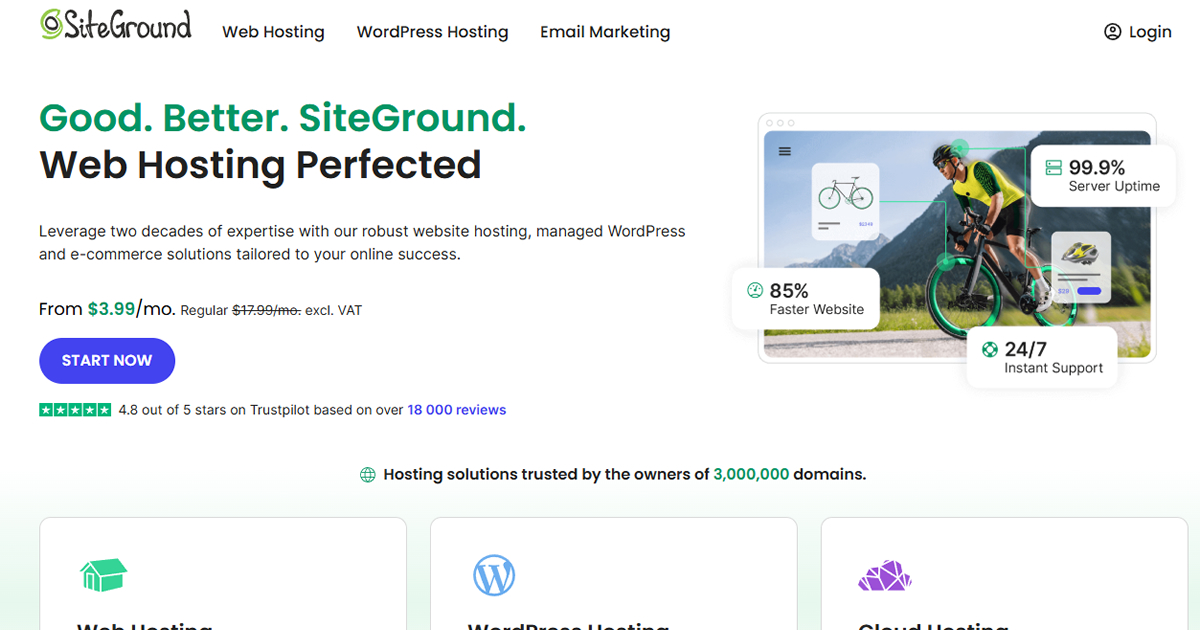TL;DR
The Best WooCommerce Hosting solutions empower your online store with reliability, speed, and scalability. The seven web hosts listed below provide optimized environments specifically tailored to enhance your WooCommerce site’s performance and user experience.
Note: While our HostingGuruReviews ratings provide a general overview of host performance, there are other factors you should consider for your specific needs. Our top hosting picks address this by offering tailored suggestions for different requirements, as demonstrated in this article.
Cloudways
Cloudways Review
Given how well Cloudways handles WordPress, it shouldn’t be surprising that it’s also an ace with WooCommerce.The highly scalable core resources and memory also allow it to grow with your online store.
Since performance is critical for WooCommerce, you’ll be happy to learn that Cloudways brings these to the fore. You can use several built-in caching mechanisms, including their Breeze plugin for WooCommerce.
Behind the scenes, Cloudways runs on a fully optimized stock and is PHP8-ready. Put everything together, and you’ve got solid, reliable performance ready to support any volume of sales. The only downside is that email hosting isn’t included but can be added cheaply.
Special WooCommerce Optimization?
Other eCommerce Supports
HostingGuruReviews
Cloudways Pros
- Topnotch server uptime and speed performance
- Good abstration over complex cloud server setups with integrated dashboard
- Outstanding customer support
- High scalability
- Easy server cloning, site staging, and website transfer
- Host unlimited applications in one account
- 25% discount for first two months with coupon “HOSTSCORE”
Cloudways Cons
- Getting expensive – Prices increased steadily for the past few years
- Limited trial period
ScalaHosting
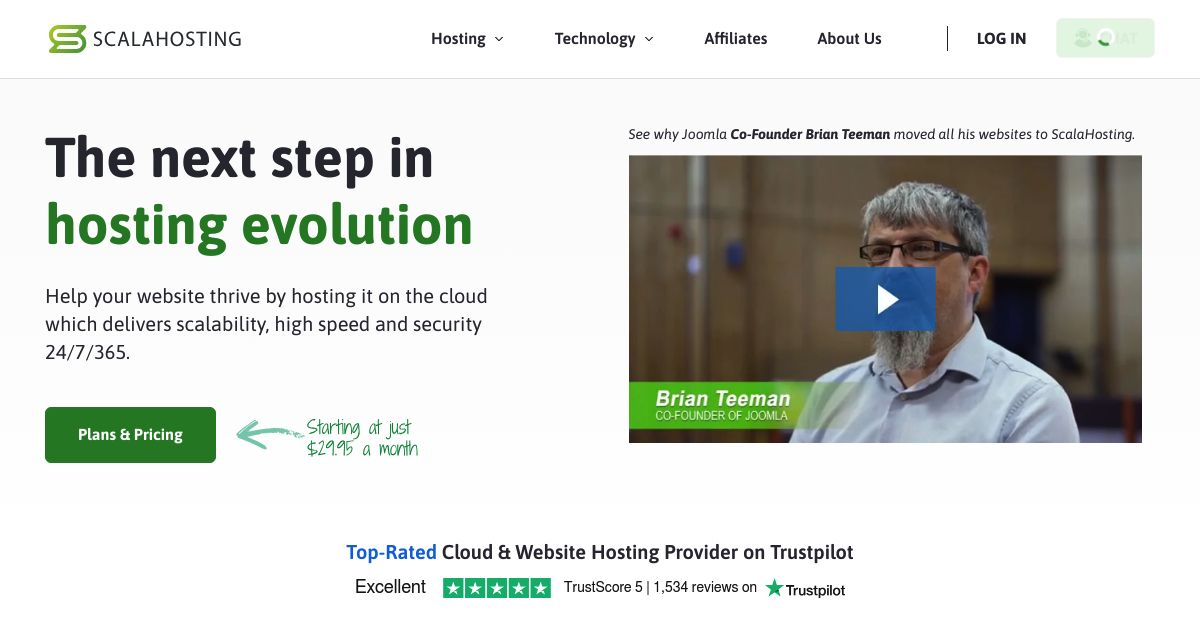
ScalaHosting Review
Being the WordPress gurus they are, it shouldn’t be surprising that we also recommend Kinsta for WooCommerce hosting. They’re the same platform, and the power that drives Kinsta hosting will easily power WooCommerce sites.
While most sites will be fine here, it’s on the business side of things where Kinsta pulls further ahead. You can use their custom API for automation and almost anything else. They even provide access to DevKinsta, a tool enabling you to develop your WooCommerce site locally.
Once everything is in place, Kinsta’s APM monitors things. This tool watches your WooCommerce site and is free for all Kinsta sites. It will notify you of any performance irregularities so you can quickly resolve potential issues.
Special WooCommerce Optimization?
Other eCommerce Supports
HostingGuruReviews
ScalaHosting Pros
- Outstanding hosting uptime and speed performance
- Affordable pricing
- Anytime unconditional Money-back Guarantee
- Automated backup with 7 restore points
- Generous offer in server resources – Even the lowest shared plan gets unmetered bandwidth and unlimited emails
- NVMe SSD storage for all shared hosting plans
- Innovative technology – SPanel, SShield, SWordPress
ScalaHosting Cons
- Price increase during the renewal
Hostinger

Hostinger Review
Can you start an online store for less than $4 monthly? The answer is yes, and it’s the typical Hostinger advantage. Its dedicated Managed WooCommerce plans tout “maximum speed, maximum profits,” which is excellent for any WooCommerce site retailer.
You also get a staggering amount of system resources to ensure you can cram and sell as many products as you like on your site. The cheapest WooCommerce plan here is estimated to serve up to 100,000 visits monthly quickly.
However, be careful about the number of files you upload since the limit here is relatively low. You only get 600,000 inodes, though that number quickly scales upward as you look at their better WooCommerce plans.
Special WooCommerce Optimization?
Other eCommerce Supports
HostingGuruReviews
Hostinger Pros
- Affordable pricing
- Nine different data centers in four continents
- Good spread of hosting plans
- User-friendly control panel (hPanel)
- Wide range of payment options accepted
- Git environment available on shared hosting
- Additional 7% discount with coupon code “HOSTSCORE”
Hostinger Cons
- Price increase during the renewal
- Does not support Windows hosting
LiquidWeb
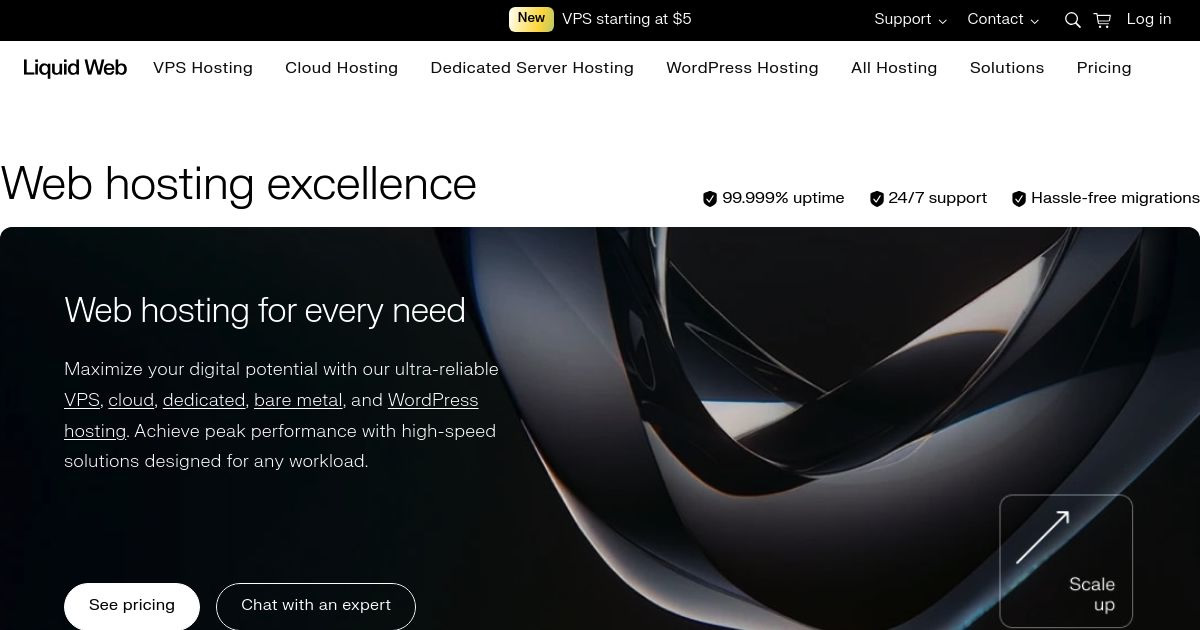
LiquidWeb Review
Like its WordPress hosting plans, WooCommerce plans at LiquidWeb are also fully managed. In fact, there are no significant differences between the two since WooCommerce is essentially built on the WordPress platform.
Because of that, you get many of the same LiquidWeb advantages, such as PHP workers, unlimited admins, 1-Click staging, and much more. The most notable for WooCommerce stores will be autoscaling, which helps keep stores afloat even under the heaviest loads.
Another advantage of LiquidWeb WooCommerce is the inclusion of premium plugins from IconicWP. These plugins are aimed at helping you boost sales. The plans are also PCI-compliant and come with regular security monitoring.
Special WooCommerce Optimization?
Other eCommerce Supports
HostingGuruReviews
LiquidWeb Pros
- Powerful enterprise hosting solutions with great scalability
- 100% network uptime, backed by detailed Service Level Agreement (SLA)
- Excellent customer support – 59-Second support response guarantee
- Self-operated data centres – Higher degree of security and data integrity compared to providers renting space from third-parties
- PCI-Compliant and HIPAA-Compliant hosting servers available
LiquidWeb Cons
- No standard shared hosting plans
- No Asia-based data center
WP Engine

WP Engine Review
Like its WordPress hosting plans, WPEngine’s WooCommerce plans are also the best. These plans primarily integrate highly WordPress or WooCommerce-centric features like Elasticsearch, instant one-click store creation, and smart WooCommerce caching.
Since we’re talking about online stores, there are also supporting services to consider. WP Engine’s WooCommerce plans come with Stripe integration, so you don’t have to worry about finding a third-party payment processor.
One notable point about WP Engine is also the user-friendly features it offers to agencies and freelance website developers. The plans are configured for easy transfer once they’re done. You can simply hand the entire thing over to a client.
Special WooCommerce Optimization?
Other eCommerce Supports
WP Engine Pros
- Outstanding server uptime and speed performance
- Round-the-clock WordPress-specialized support
- Developer-friendly environment
- Genesis framework and StudioPress themes included
- Choice of 20+ server locations in four continents
WP Engine Cons
- Email hosting services not included
- Only WordPress plans available
- Bandwidth and some server resources are highly limited
- No white-glove site migration
InMotion Hosting
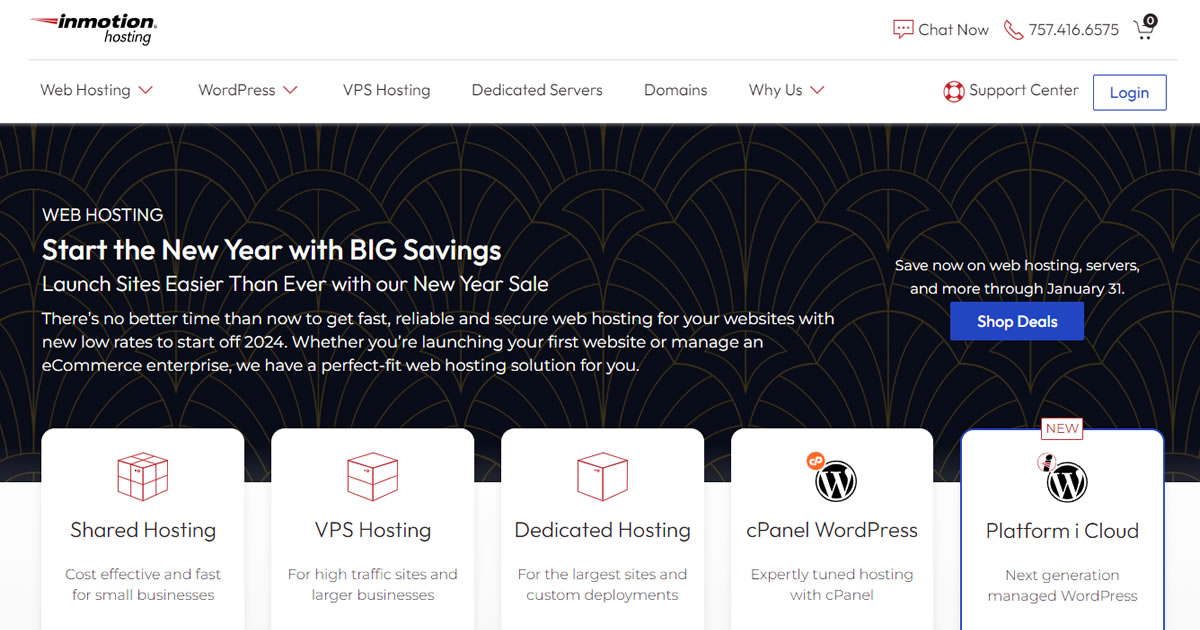
InMotion Hosting Review
WooCommerce site owners are more limited since InMotion assumes you’ll want excellent reliability and performance. Their WooCommerce plans are only available on “Platform i.” They call it “fast, convenient, and secure.” which sounds about right.
You get access to an all-in-one control panel, a fully optimized WooCommerce stack, zero-hassle management, top-notch security, and seamless migration. It’s simply a business owner’s dream come true.
WooCommerce “Platform i” plans at InMotion are cheaper than its VPS plans, and there are more hands-off management features. However, One downside is the need for more transparency regarding precisely how robust and fast these plans perform.
Special WooCommerce Optimization?
Other eCommerce Supports
HostingGuruReviews
InMotion Hosting Pros
- Affordable pricing
- Lowest shared hosting plan supports Python, Node.JS, Ruby and GIT version control
- Choice of data center locations in the United States and Europe
- Free AutoSSL
- Built-in hack, DDoS, and malware protection
- 90-day money back guarantee
- Free website migration services
InMotion Hosting Cons
- Lower shared hosting plans lack speed optimization
- Price increase during the renewal
GreenGeeks

GreenGeeks Review
WooCommerce site owners have less to worry about since GreenGeeks has created a custom lineup of hosting plans for the platform. These plans are similar to the shared hosting plans here but have several advantages.
For example, in addition to the typical goodies, you get WordPress-centric features like ready installation, free migration for WordPress sites, and auto-updates. They also enable caching and provide access to CP-CLI to give you greater control.
We only frown slightly upon the very vague nature of the performance statement. GreenGeeks simply tells us that the cheaper plans have “standard performance” and the most expensive have “best performance.” It’s not awe-inspiring.
Special WooCommerce Optimization?
Other eCommerce Supports
HostingGuruReviews
GreenGeeks Pros
- Returns 3x power consumed with renewable energy credits
- Affordable pricing
- Free daily backup for all shared hosting plans
- All plans support Perl, Python and Git
- Free website migration assistance
- Root access, control panel and cPanel/WHM included in reseller hosting plans
GreenGeeks Cons
- Price increase during the renewal
- Slightly lacklustre customer service
- Non refundable setup fees
DreamHost
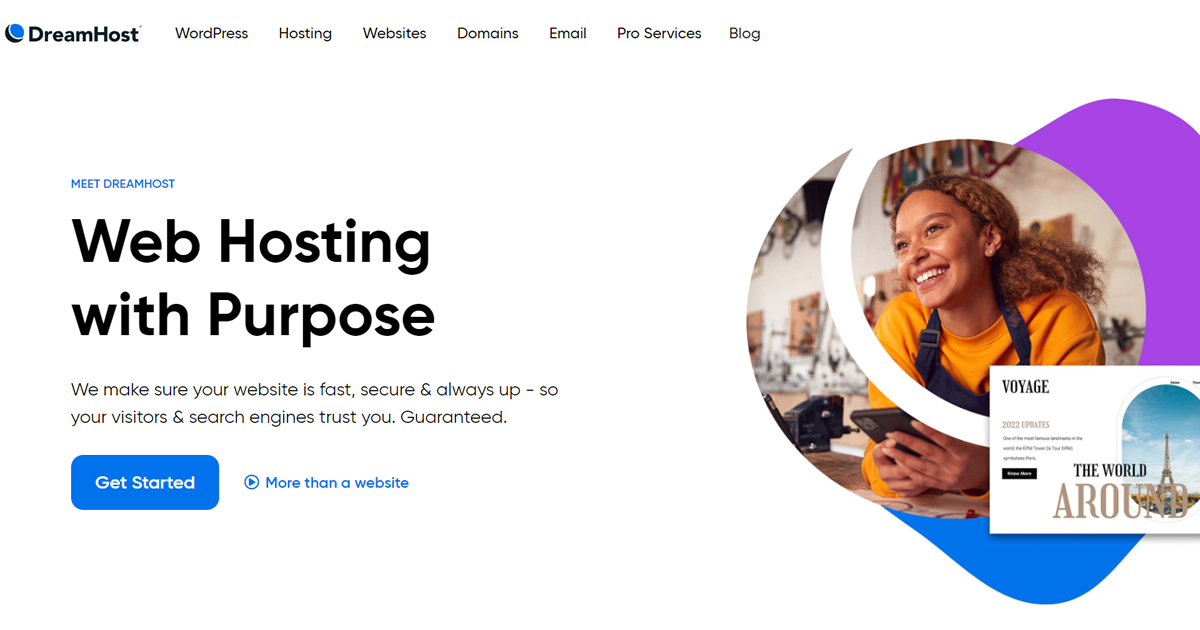
DreamHost Review
DreamHost has dedicated WooCommerce plans, but these are the same as their DreamPress Managed WordPress hosting offerings. The only difference is that you get WooCommerce pre-installed, which is simple to do anyway.
The bright side is that with the power of DreamPress, your WooCommerce site will run sweetly and smoothly. You also get the same advantages: a pre-installed SSL certificate, unlimited email, and 1-Click staging.
DreamHost also claims to offer specialized WordPress support, but how far the extent of their specialization goes still needs to be confirmed. At least they have many happy customers who will testify to the power of their WooCommerce hosting plans.
Special WooCommerce Optimization?
Other eCommerce Supports
HostingGuruReviews
DreamHost Pros
- Reliable server uptime performance
- Daily backup included in all shared hosting plans
- 97-day Money back guarantee
- Extensive knowledgebase
DreamHost Cons
- Price increase during the renewal
- Live chat support can be better
- Server location in the United States only
- No free site migration assistance
BlueHost

BlueHost Review
Bluehost offers two primary WooCommerce plans. These are relatively inexpensive, but we wouldn’t call them cheap. They come with website analytics, a free trial of professional email services, and Yoast SEO.
The plans also include a smattering of integrations with several notable third parties. For example, you get bookings, appointment handling, gift cards, and themes from YITH. On the technical side, JetPack takes over most maintenance and other details.
Along with those goodies come standard features like automated updates, support for unlimited products, and multi-channel inventory. Be aware that prices do take significant hikes after the honeymoon period.
Special WooCommerce Optimization?
Other eCommerce Supports
HostingGuruReviews
BlueHost Pros
- Free domain name with all shared hosting plans
- $100 free ad credits with all plans
- Comprehensive and easy-to-navigate knowledgebase
BlueHost Cons
- Renewal fees can be significantly higher
- Many upsells on additional features
- Add-ons can get expensive
- Only US-based servers
- Customer support can be better
What is WooCommerce?
WooCommerce is a free, open-source eCommerce plugin designed specifically for WordPress (download page here). This powerful plugin transforms a WordPress website into a fully functional online store, allowing users to sell both digital and physical products. Its versatility and user-friendly interface make it a popular choice among small to large-sized online merchants.
How is the WooCommerce Plugin Different?
WooCommerce distinguishes itself in several key areas:
- WordPress Integration: Unlike standalone eCommerce platforms, WooCommerce is a plugin for WordPress, which means it integrates directly into any WordPress website. This integration allows users to leverage the powerful content management capabilities of WordPress alongside their eCommerce activities, providing a seamless blend of blogging and online sales.
- Open-Source and Customizable: WooCommerce is open-source, offering unparalleled flexibility and customization. Users can modify the source code to tailor the eCommerce experience exactly to their needs – which is not always possible with proprietary platforms that often come with restrictions.
- Cost-Effectiveness: The core WooCommerce plugin is free, which stands in contrast to many eCommerce platforms that require monthly subscriptions. While there are costs associated with advanced plugins, themes, and hosting, the ability to control these costs based on specific needs makes WooCommerce an attractive option for businesses of all sizes.
- Community Support: The strength of WooCommerce also lies in its large and active community. Being a popular choice for online stores, it has a wide range of forums, tutorials, and dedicated support services. This extensive support network can be invaluable for troubleshooting, learning, and exploring new ways to enhance your store.
What are Some Alternatives to WooCommerce?
There is a diverse array of eCommerce platforms similar to WooCommerce. Listed below are five examples of popular WooCommerce alternatives, each with its unique features and benefits:
1. Shopify
Shopify is a comprehensive, hosted eCommerce platform that simplifies the process of building and managing an online store. It offers a wide range of themes and apps to customize your store, and its hosted nature means you don’t have to worry about web hosting, security, or updates.
2. Magento (Adobe Commerce)
An open-source eCommerce platform acquired and now owned by Adobe, Magento is known for its flexibility, powerful features, and scalability. It’s suited for medium to large businesses that require extensive customization and have the resources for development and maintenance. Magento also offers a hosted version, Adobe Commerce, which includes additional features and support.
3. BigCommerce
A hosted eCommerce solution that offers a comprehensive set of features out of the box, including various payment gateway integrations, SEO tools, and multi-channel selling capabilities. BigCommerce is designed to support businesses of all sizes, and its focus on scalability and performance makes it a strong contender for growing businesses.
4. Squarespace
Known for its stunning design templates and intuitive drag-and-drop interface, Squarespace is a website builder that also offers strong eCommerce capabilities. It’s ideal for small businesses and creatives looking to combine a visually appealing online presence with eCommerce functionality. Squarespace simplifies the process of setting up an online store, though it may not offer the same level of customization or scalability as more dedicated eCommerce platforms.
5. Wix
Wix allows users to create an online store using drag-and-drop tools, making it accessible for those with limited technical expertise. It provides various templates and apps to enhance your store, although it might be more suited for small to medium-sized businesses due to its scalability limitations compared to platforms like Shopify or Magento.
What is WooCommerce Hosting?
WooCommerce Hosting refers to a specialized web hosting solution optimized for WooCommerce. It often includes features like pre-installed WooCommerce and WordPress, enhanced security measures to protect sensitive customer data, and performance optimizations such as faster loading times and increased scalability to handle high traffic volumes.
Additionally, a great WooCommerce hosting provider usually offers dedicated expert support in WooCommerce and eCommerce, helping store owners to troubleshot their online store issues and maximize their eCommerce site’s potential.
How Much Does a Good WooCommerce Host Cost?
The cost of a good WooCommerce hosting solution can vary widely depending on several factors, including the size of your online store, the level of traffic you expect, and the specific hosting features you need.
However, to provide a general idea, here’s a breakdown of typical hosting tiers and their costs:
| Hosting Type | Price Range Per Month | Provider | Ideal For | Key Features |
|---|---|---|---|---|
| Shared Hosting | $5 – $25 | Hostinger | Small stores or startups with low traffic | Cost-effective, limited resources |
| VPS Hosting | $20 – $100 | ScalaHosting | Growing eCommerce sites | Better performance, customization options |
| Dedicated Hosting | $80 – $300+ | LiquidWeb | Large eCommerce stores with high traffic | Maximum performance, security, and control |
| Managed WooCommerce Hosting | $30 – $250+ | WP Engine | WooCommerce stores of all sizes | Optimized environment, automatic updates, support |
| Cloud Hosting | Varies based on usage | Cloudways | Stores with fluctuating traffic | Scalability, flexibility, pay-for-what-you-use |
How to Choose the Best WooCommerce Hosting?
Choosing the best WooCommerce hosting for your eCommerce website is similar to most web hosting choosing process. Follow these steps to make an informed decision:
- Assess Your Needs: Begin by evaluating the size of your online store, expected traffic, and specific requirements like the number of products, images, and videos you plan to host. Understanding your needs will help you determine the type of hosting (shared, VPS, dedicated, managed, or cloud) that’s most suitable.
- Consider Performance and Reliability: Look for hosting providers that offer high uptime guarantees (99.95% and above) and fast loading times. Performance is crucial for customer satisfaction and SEO rankings.
- Evaluate Scalability: Your hosting should be able to grow with your business. Choose a provider that allows easy upgrading of hosting plans without significant downtime or hassle, accommodating increased traffic and resources as your store expands.
- Check for WooCommerce-Specific Features: Some web hosts – like the ones that we mentioned above, offer features tailored to WooCommerce, such as one-click install, pre-installed WooCommerce, automatic updates, and specialized support. These features can save time and enhance your store’s performance.
- Review Security Measures: Security is paramount for an eCommerce site. Look for hosting plans that include SSL certificates, daily backups, and robust protection against malware and hacking attempts. Consider hosts that offer dedicated IP addresses and advanced security features.
- Analyze Customer Support: Reliable, 24/7 customer support is essential. Ensure the hosting provider offers multiple support channels (live chat, phone, email) and has a good reputation for responsive and knowledgeable support, particularly in resolving WooCommerce-related issues.
- Read User Reviews and Testimonials: User experiences can provide valuable insights into the reliability and quality of the hosting service. Look for reviews focusing on eCommerce sites and note any recurring issues or praises.
- Consider Pricing and Value: While cost is an important factor, it should not be the sole deciding factor. Evaluate what you get for the price – not just in terms of hosting resources but also additional services, support quality, and WooCommerce-specific optimizations.
- Test the Service: If possible, take advantage of any free trials or money-back guarantees to test the hosting service firsthand. This allows you to evaluate the performance, user interface, and customer support before making a long-term commitment.
By carefully considering these factors, you can choose a WooCommerce hosting provider that not only meets your current needs but also supports the future growth and success of your online store.
Is WooCommerce Hosting a Must to Run a WooCommerce Site?
While WooCommerce hosting offers several advantages, it’s not strictly necessary to run a WooCommerce site. A regular web hosting service that supports WordPress can also host a WooCommerce store. Though, choosing WooCommerce hosting could significantly benefit store owners looking for optimal performance, enhanced security, and specialized support.
WooCommerce Hosting vs Regular Hosting
| Aspect | WooCommerce Hosting | Regular Web Hosting |
|---|---|---|
| Performance | Optimized specifically for WooCommerce sites, potentially offering faster loading times due to server-side optimizations. | May not be optimized for WooCommerce, potentially resulting in slower performance for eCommerce sites. |
| Security | Enhanced security measures tailored for online transactions, including features like SSL certificates and additional protections for handling customer data. | Basic security features that may not fully cater to the specific needs of eCommerce sites, potentially requiring additional security plugins or services. |
| Support | Specialized customer support knowledgeable in WooCommerce, offering assistance tailored to eCommerce concerns. | General customer support that may not have specific expertise in WooCommerce, possibly making it harder to resolve platform-specific issues. |
| Ease of Use | Features like one-click WooCommerce installations and automatic updates for WordPress and WooCommerce, aimed at simplifying site management for store owners. | May require manual installation and updates for WooCommerce, with less focus on eCommerce-specific management tools. |
| Pricing | May be higher due to specialized services and optimizations for WooCommerce. Offers plans that cater specifically to the needs of eCommerce sites. | Generally offers a range of prices from budget to premium, depending on the type of hosting (shared, VPS, dedicated). Not specifically priced for WooCommerce needs. |
| Scalability | Often designed with scalability in mind, allowing for easy upgrades to handle increased traffic and sales as your store grows. | Scalability varies by hosting plan; some may require manual migration to more powerful options as your site grows. |
| Customized Solutions | May include WooCommerce-specific tools and features, such as staging sites for testing, specialized caching, and more. | Less likely to offer tools and features specifically for WooCommerce, focusing instead on general WordPress or website needs. |
WooCommerce & WooCommerce Hosting FAQs
What exactly is WooCommerce?
WooCommerce is a free, open-source plugin for WordPress that enables users to create and manage online stores. It offers customizable options for selling physical and digital products, and integrates various payment and shipping methods.
Do I need to pay to use WooCommerce?
No, you don’t need to pay a dime to use WooCommerce. WooCommerce is a free, open-source eCommerce plugin for WordPress. While the core plugin is free, there are potential costs associated with creating and maintaining a fully functional online store.
How much does it cost to build an online store with WooCommerce?
Building an online store with WooCommerce can start from $100 to $150 yearly for basic setups, including hosting, domain, and basic themes/plugins. Costs can rise significantly for advanced features, custom designs, and premium plugins, reaching into the thousands. Ongoing expenses for maintenance and marketing should also be considered.
Can I migrate my WooCommerce store to another web host after creating it?
Yes, you can migrate your existing WooCommerce store to a new web hosting provider easily. The process involves transferring your website’s files, databases, and potentially your domain registration to the new hosting environment. It is often necessary for scaling, improving performance, or achieving better hosting service. You may choose to perform the migration yourself, use a plugin designed for migrations, or enlist migration services offered by professional WooCommerce developers. Many hosting providers, for example ScalaHosting and Hostinger, are willing to help migrate your WooCommerce site for free when you signup.
What is the maximum number of products I can sell on my WooCommerce website?
WooCommerce does not impose a hard limit on the number of products you can sell on your online store. The platform is designed to scale, allowing you to list thousands of products, ranging from physical goods to digital downloads and services.
What are some of the key features to consider when choosing a WooCommerce hosting?
Key features for WooCommerce hosting include performance (SSD, caching, CDN), security (SSL, backups, security plugins), scalability, specialized WooCommerce support, uptime reliability, and WooCommerce compatibility and ease of use.
Do I need a lot of server resources to run a WooCommerce website?
No, small WooCommerce sites need modest resources; larger sites require more robust hosting for optimal performance.
Final Thoughts on WooCommerce Hosting
Choosing the right WooCommerce hosting is crucial for your online store’s success. From budget constraints to scalability and performance demands, we have showcase a range of options that cater to different needs on this page.
Each listed WooCommerce host offers unique advantages. Hostingerand ScalaHosting excel in affordability and features. Cloudways stands out for its flexibility. Kinsta and WP Engine offer premium managed services. DreamHost is officially endorsed by WordPress.org.
Explore these options further and select the one that best fits your online store’s requirements.
